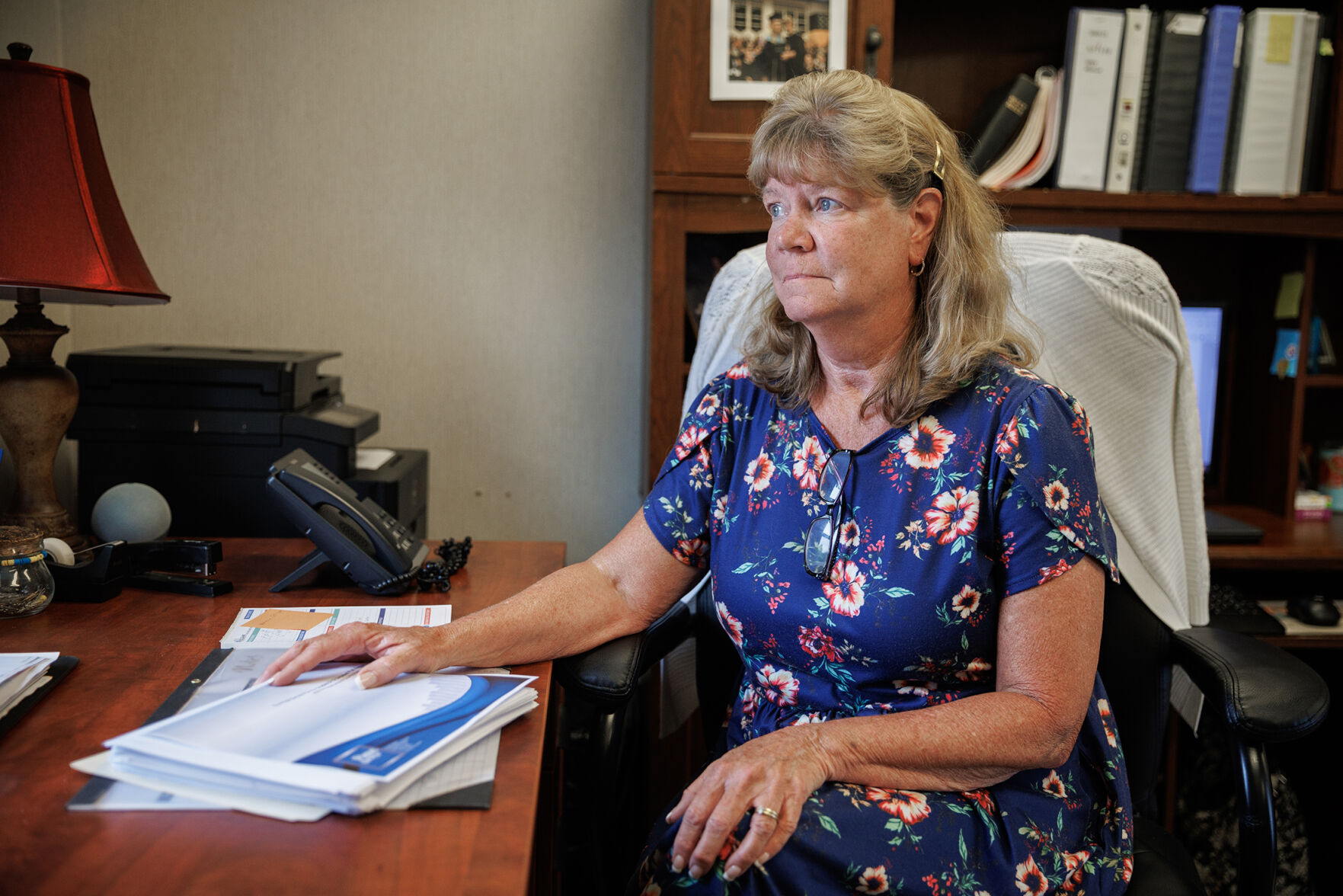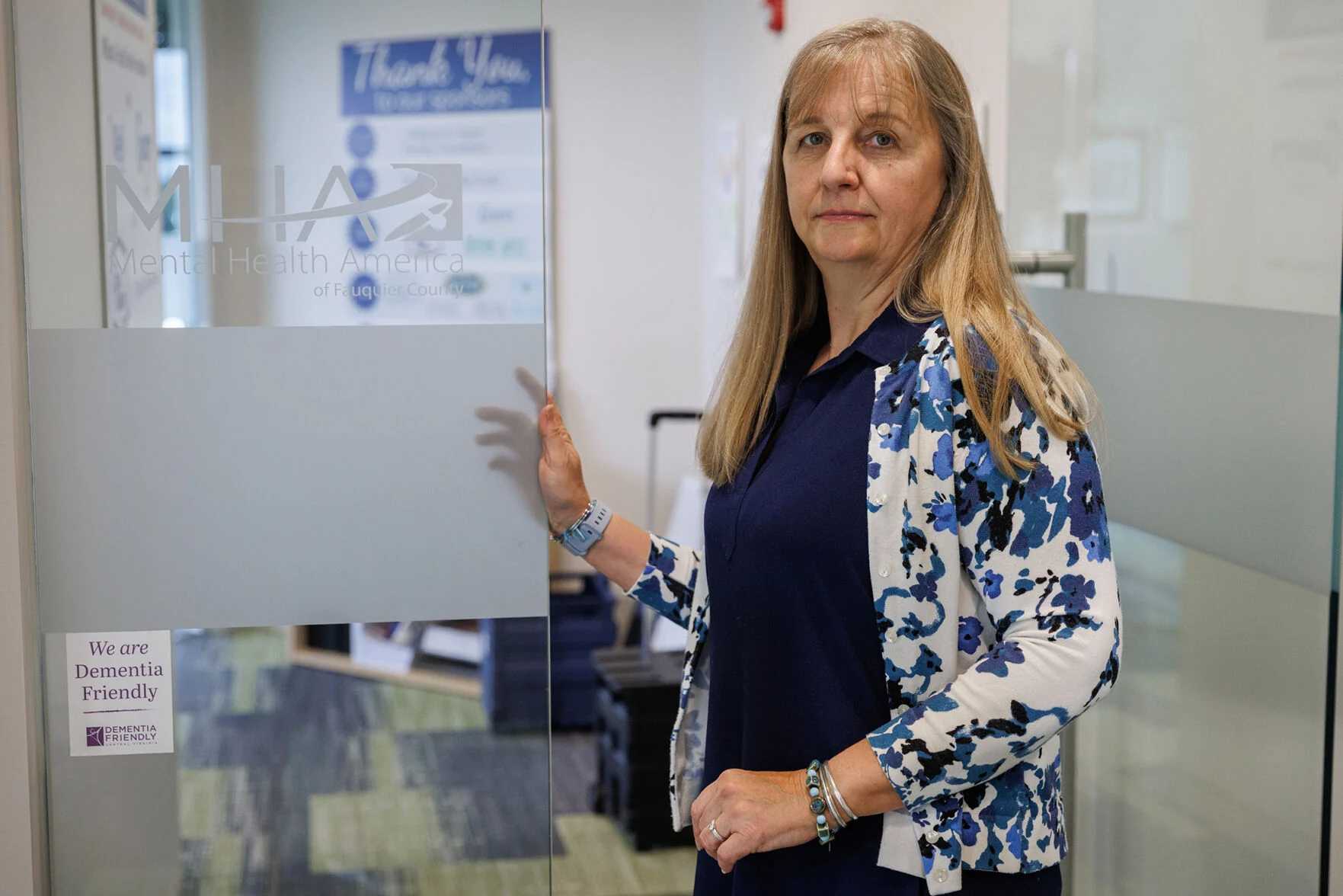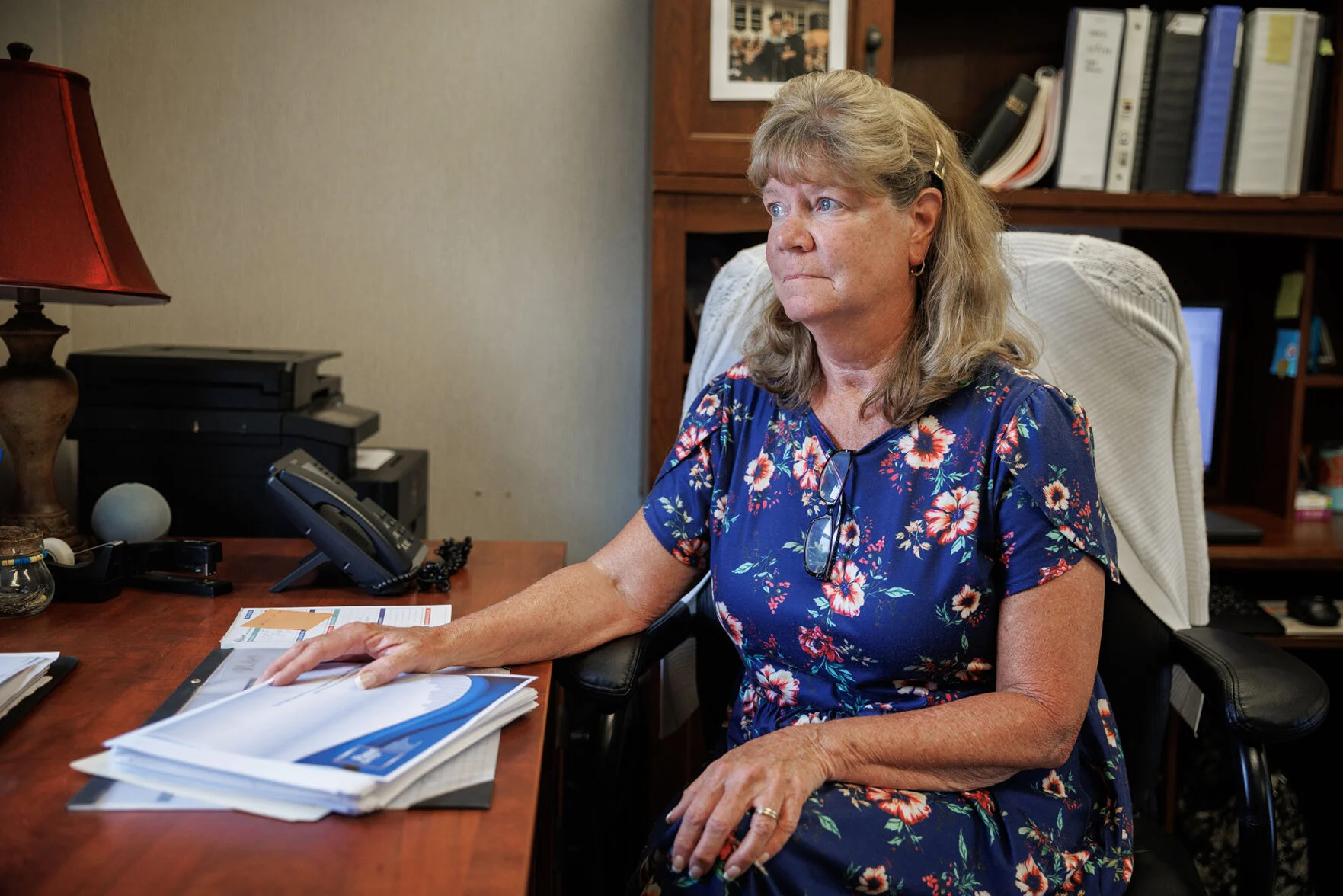What schools and parents can do
Time was when teen dread and dark moods were largely viewed as unfortunate features of adolescence, conditions driven by insecurities and hormonal changes that in time would pass.
It’s an attitude that can linger, particularly among members of older generations who wonder why the mental health issues facing young people today are seen as particularly challenging.
“This is beyond the disaffected teenager stereotypes we’ve all seen in literature and cinema,” said Russell Houck, executive director of student services at Culpeper County Public Schools. “Everybody thinks their generation had it tough. This generation has a different challenge.”
Renee Norden, executive director of the Mental Health Association of Fauquier County, now sees adolescent angst and moodiness affecting young people more intensely and for longer periods of time, in part because they feel increasingly lonely and disconnected.
“Family interactions and community involvement have been decreasing since the early 2000s,” she said, pointing out that easy access to cellphones and social media for both parents and their children can weaken their connection.
“Feeling connected and having purpose are the two strongest protective factors in mental wellness,” Norden said.
Mental Health First Aid
For people like Houck and Norden, a promising development has been a softening of the stigma that mental health conditions have long carried.
“The public’s awareness of this is probably one of the most successful things we’ve done,” Houck said. “Simply talking about it has opened up people’s minds to help explain kids’ behavior.”
That has enabled school districts and social services agencies to shift more of their focus to preventing mental health crises rather than just reacting to them. Suicide, for instance, is no longer a taboo subject; it’s now discussed openly, with an emphasis on responding quickly and empathetically to students perceived at risk.
Case in point is the growing number of school teachers and administrators in the region who have received Youth Mental Health First Aid training. It’s usually a daylong program in which participants not only learn to spot signs and symptoms of mental health and substance use issues, but also how to interact with someone in crisis and connect them with professional help.
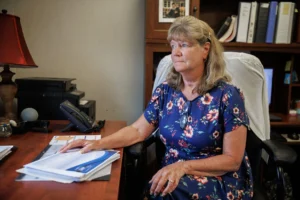
RCPS Assistant Superintendent Carol Johnson at her office in Washington, Va. (Photo/Luke Christopher)
All of the teachers and most of the staff at Rappahannock County Public Schools have taken the course, according to Assistant Superintendent Carol Johnson. In Fauquier County Public Schools, more than half of the teachers and staff have done so, said Nicholas Napolitano, the school district’s executive director of student services.
Fauquier, however, provides a teen version of the training to 10th graders during the semester they take a driver’s education course.
“None of this teaches teens how to diagnose a mental health condition, but just how to help a friend who might be in crisis, and connect them with an adult,” explained Norden, whose organization provides training in Rappahannock and Fauquier.
She said an attempted suicide by a senior at Kettle Run High School in 2022 prompted teachers there to ask to be retrained. “They were so surprised by what happened,” she said. “It was so off their radar because this boy was active. People didn’t realize what was going on.”
Alan Rasmussen understands how that can happen. He’s a suicide prevention expert at the Culpeper-based nonprofit agency Encompass Community Supports, and in that capacity he often speaks at area schools. Rasmussen said he’s not reluctant to “use the S word” in his talks, and that openness about suicide, he believes, has made it easier for audience members to approach him afterwards and share concerns about their own mental health.
He said he talks a lot about resiliency, but also about hope.
“Hope saves lives,” Rasmussen said. “It’s a light in the darkness. Hopelessness is deadly. When people see no light, they see no way out of whatever is going on. And they go, ‘Hey, I’m done. I’m out of here.’”
A different part of learning
To prevent young people from reaching that level of despair, school districts continue to ratchet up programs geared to their students’ social and emotional well-being. With a new “transition coach” added to the Rappahannock County Public Schools’ staff, for instance, the school district’s mental health team plans to use more group counseling sessions this year to help kids improve their social skills, such as learning to resolve conflicts and managing anger. The transition coach is expected to take on more of the one-on-one counseling with students.
In Fauquier County, where each public middle school and high school will now have its own social worker, counselors will work with students on different issues, starting with bullying for the first nine weeks, followed by similar sessions on regulating behavior, kindness and mental wellness.
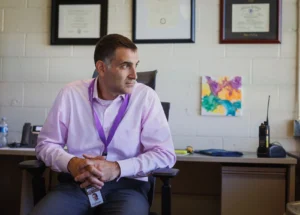
“Sometimes the community just thinks of school as you go to class and you learn about science, math and history, right? But there’s really more to it than that,” said Nicholas Napolitano, Fauquier County Public Schools’ executive director of student services. (Photo/Luke Christopher)
“It’s important to make the community aware that these things are happening and will continue to happen,” said Fauquier’s Napolitano. “Sometimes the community just thinks of school as you go to class and you learn about science, math and history, right? But there’s really more to it than that.”
In Culpeper, in response to concerning feedback regarding anxiety and depression in a Youth Risk Behavior Survey of students, the school district adopted “student wellness” goals, such as training staff, students and parents to recognize “signs of mental health and emotional distress in children” and providing students “with explicit instructions in social skills.”
“I would like to think that our focus on this has opened up conversations that might not have happened,” said Houck, the Culpeper administrator. “Years ago, if we had a high school kid who was disengaged from school, we would have probably viewed them as just being unmotivated. But now teachers, parents and staff are thinking, ‘Maybe we need to screen this kid for depression and anxiety.’”
Spotting danger signs
That growing awareness of students’ mental health issues is a big step forward, say school administrators and social workers, particularly when it involves their parents.Their ability to spot danger signs and recognize risk factors in their children often is the key to whether they get help.
But there can be complications. “A lot of parents have their own traumas they’re working through,” said Taisha Chavez, director of children’s services at Encompass. “Sometimes they are parenting and reacting based on their own experiences. So we try to connect not just the kid to support, but also the family. What do the caregivers need to know to manage their own stress and be successful in all this?”
Sometimes, say school administrators, parents also have their own addictive behavior when it comes to engaging with social media. That can result in fewer, less meaningful interactions with their children, and make it more likely that they will miss signs that their kids are struggling.
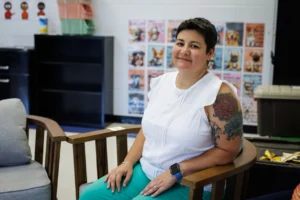
Erica Jennejahn at school counselor’s Kayla Rutherford’s office at Rappahannock County Elementary School, where they hold individual and group counseling sessions. (Photo/Luke Christopher)
“It’s a question of how do we connect with our kids,” said Erica Jennejahn, social worker for Rappahannock County Public Schools. “How do we put the phones down?”
To that end, Jennejahn said she’s looking at a program called Families and Schools Together (FAST). It’s designed to bring together parents, students and school staff on a weekly basis over a two-month period. They would share meals, play games and have conversations involving whole families.
“I think it could be a great opportunity for us to connect with families in a positive way instead of them just getting phone calls about how their kid isn’t doing well, or struggling academically, or having problems with attendance,” she said. “It’s also a chance for families to have meals together.”
If the Rappahannock school district decides to adopt FAST, it would likely seek grant funding to cover the cost, according to Jennejahn.
Engaging parents
For parents of young children with serious behavioral issues — a number that seems to be increasing since the pandemic — Chavez, at Encompass, cited a program called Parent-Child Interaction Therapy. Designed for children from ages two to seven, it involves a parent or caregiver playing with a child while a licensed clinician watches from another room and provides coaching feedback to the adult through an earpiece.
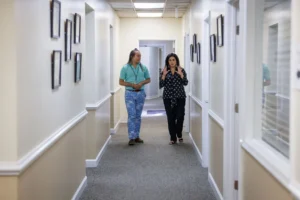
Community Outreach Specialist Chris Eaglin with Taisha Chavez, director of children services at the regional agency Encompass Community Supports in Culpeper, Va. (Photo/Luke Christopher)
“A lot of the kids in this program don’t like the word ‘no.’ Sometimes they’re aggressive with their peers, and their family as well,” she said. “The program is meant to give parents skills to manage those behaviors and build a positive attachment to the child.”
Getting parents — and more broadly, the outside community — engaged with efforts to address student mental health needs will be critical to their success, say school administrators and social workers.
The value of programs such as Mental Health First Aid, they point out, is that it helps people better handle what Norden described as “difficult conversations.” She cited a National Institutes of Health statistic that, for people of all ages, the average delay between the onset of a mental health condition and getting treatment is 11 years.
Houck said that’s why it’s important that parents learn to recognize the signs that their children may be struggling, and that they reach out for help.
“Parents have the biggest influence on their children and that’s how it should be,” he said. “But we want to make sure that the parents know they have resources to intervene when their kids are not responding to what you’d consider normal parent intervention.
“If your normal parenting interventions aren’t working, it probably means you need help from a professional,” he added. “More and more parents are recognizing that these are not just teenage issues.”
For Jennejahn, a key is reopening connections and rebuilding communication skills diminished by forces such as social media and ubiquitous cellphones. She pointed out that young people today are dealing with stressors their parents didn’t really experience when they were their age.
“It’s been challenging to teach my own kids, niece and students how to handle conflict in a social media world I don’t live in as an adult,” she said.
That’s why Jennejahn feels it’s so critical to find positive ways to work with parents to navigate what for many are uncharted waters.
“Sometimes I think about the interactions we have with parents who are really upset about something, and the dialogue goes in a direction that prevents us from making progress,” she said.
“But at the end of the day, people are advocating for their kids. So how can we all come to the table and do that in a way that’s productive? How can we teach kids the skills they need?”
Resources for getting help
Events
Aug. 24, 9 a.m.-3:30 p.m.: Youth Mental Health First Aid Training, at PATH Foundation, 321 Walker Drive, Warrenton. Sign up online or contact Bridget Downey at 540-341-8732.
Sept. 4, 9 a.m.-3:30 p.m.: Youth Mental Health First Aid Training, at PATH Foundation, 321 Walker Drive, Warrenton. Sign up online or call 540-341-8732.
Sept 12, Noon-1 p.m.: Lunch and Learn: “Addressing Youth Substance Use and Mental Health in Our Region.” Zoom event. Contact Bridget Downey 540-341-8732.
Sept. 24, 9 a.m.-3:30 p.m.: Adult Mental Health First Aid Training, at PATH Foundation, 321 Walker Drive, Warrenton. Sign up online or call 540-341-8732.
Sept. 27, 1-5 p.m.: Stamping Out Suicide: A free event on the theme of “Creating Hope Through Action.” Keynote address by Anne Moss Rogers, mental health and suicide education expert. Hazel Hall, Laurel Ridge Community College, 6480 College St., Warrenton.
Crisis lines
Suicide and Crisis Lifeline: Call or text 988
Encompass Community Supports: 24/7 crisis services line: 540-617-0774
Mental Health Virginia Warm Line: A peer-run line for those seeking non-judgmental support or to receive referrals for mental health services: 866-400-6428
Resources
Mental Health First Aid Training at PATH Foundation: 321 Walker Drive, Warrenton. Sign up online or contact Bridget Downey at 540-341-8732.
Encompass Community Supports Child and Youth Services: 540-672-2990
Mental Health Association of Fauquier County: 540-341-8732
Free Clinic of Culpeper: 540-829-5032. 610 Laurel St., Culpeper.
Fauquier Free Clinic: 540-347-0394. 35 Rock Pointe Lane, Warrenton.
— Randy Rieland
Explore the series
This is the third and last part of a series on the mental health struggles of today’s generation of teenagers, the urgent need for more support in schools and how families can get help.
Read the first two stories:
Part 1: Mounting student anxiety and depression and how schools scramble to keep up
Part 2: How social media is linked to rising anxiety among teens

Foothills_logo_10year_horizon
Foothills Forum is an independent, community-supported nonprofit tackling the need for in-depth research and reporting on Rappahannock County issues.
The group has an agreement with Rappahannock Media, owner of the Rappahannock News, to present this series and other award-winning reporting projects. More at foothillsforum.org.



